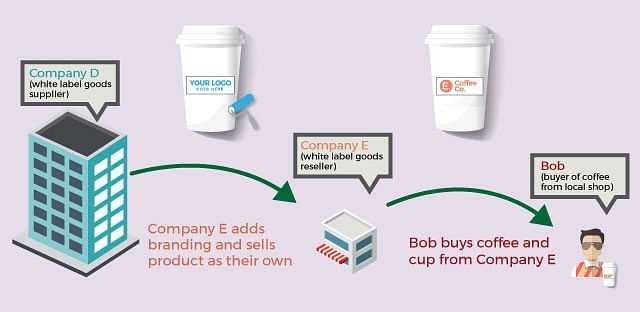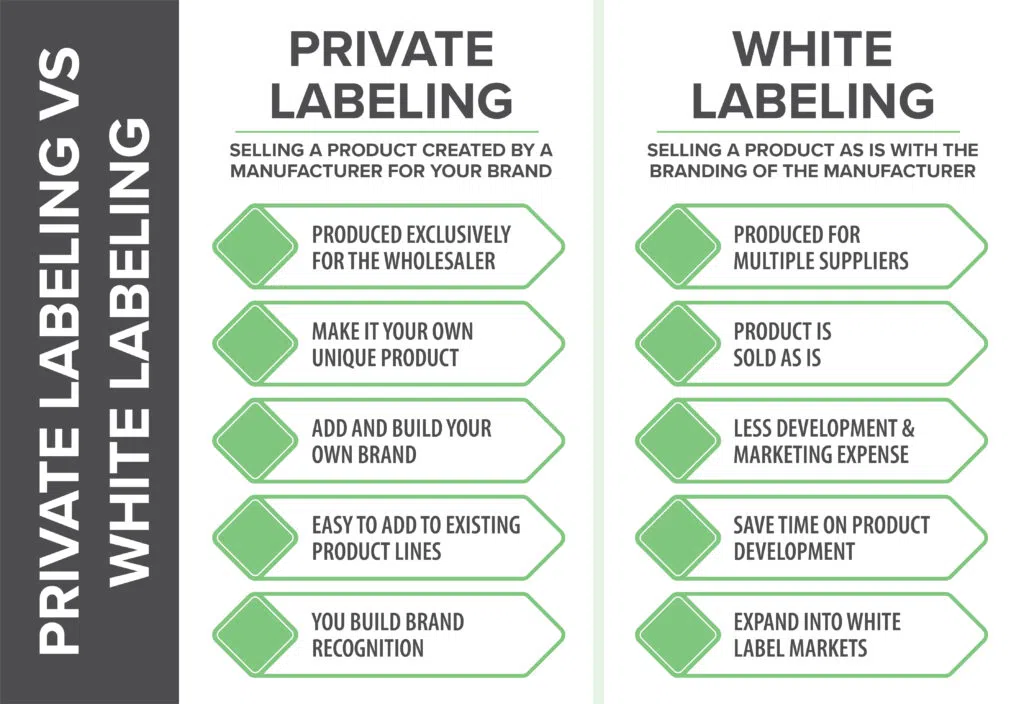What Is a White Label Product?
A white label product is a product or service that is created by one company and then rebranded and sold by another company as its own. In other words, the company that sells the white label product does not manufacture or develop the product themselves, but rather purchases it from a third-party manufacturer or provider and puts their own branding on it.
Definition and Explanation
The term “white label” originates from the practice of putting a white label on a product, which allows the reseller to add their own branding and identity to the product. White label products are commonly used in various industries, including software, consumer goods, and digital services.
When a company decides to offer a white label product, they typically choose a product that complements their existing offerings or fills a gap in their product line. This allows them to expand their product offerings without the need for additional resources or expertise in product development.
Benefits of White Label Products
There are several benefits to offering white label products:
- Brand Expansion: By offering white label products, companies can expand their brand presence and reach new customers without the need for extensive marketing or product development.
- Cost Savings: Instead of investing in the development of a new product from scratch, companies can save time and resources by purchasing a pre-existing white label product.
- Time-to-Market: White label products allow companies to quickly enter new markets or offer new products without the time-consuming process of product development.
- Customer Loyalty: By offering a white label product that meets the needs of their customers, companies can build customer loyalty and increase customer satisfaction.
How White Label Products Work
When a company decides to offer a white label product, they typically enter into a partnership or agreement with a third-party manufacturer or provider. The company then purchases the white label product from the manufacturer or provider at a wholesale price, adds their own branding and packaging, and sells it to their customers at a retail price.
Examples of Successful White Label Products
There are many examples of successful white label products in various industries:
- In the software industry, companies like Microsoft offer white label versions of their products to be sold by other companies under their own brand names.
- In the consumer goods industry, private label brands like Kirkland Signature (Costco) and Great Value (Walmart) offer white label products that are often comparable in quality to well-known national brands.
- In the digital services industry, companies like Shopify offer white label solutions for e-commerce platforms, allowing businesses to create their own online stores under their own brand names.
These examples demonstrate the versatility and potential for success that white label products can offer to companies in various industries.
Definition and Explanation
A white label product is a product or service that is created by one company and then rebranded and sold by another company as if it were their own. The term “white label” comes from the practice of putting a white label on a product, allowing the reseller to add their own branding and logo.
When a company decides to create a white label product, they typically work closely with the manufacturer or supplier to customize the product to their specifications. This can include adding their own branding, packaging, and labeling. The end result is a product that appears to be created by the reseller, even though it was actually produced by a third party.
The advantage of white label products is that they allow companies to quickly enter new markets or offer new products without the need for extensive research and development. It also allows them to leverage the expertise and resources of the manufacturer or supplier, reducing costs and time to market.
White label products are commonly used in industries such as cosmetics, food and beverages, technology, and retail. For example, a grocery store may sell white label products such as canned goods or cleaning supplies that are produced by a third-party manufacturer but branded with the store’s own name and logo.
Key Points:
– A white label product is a product or service that is created by one company and then rebranded and sold by another company as if it were their own.
– White label products allow businesses to expand their product offerings without investing in development and manufacturing.
– The reseller can customize the product with their own branding and packaging.
– White label products reduce costs and time to market, allowing companies to quickly enter new markets or offer new products.
– White label products are commonly used in industries such as cosmetics, food and beverages, technology, and retail.
References:
[1] Business News Daily. (2021, May 13). What Is a White Label Product and How Does It Work? Retrieved from https://www.businessnewsdaily.com/15732-white-label-products.html
[2] Investopedia. (2021, May 18). White Label Product. Retrieved from https://www.investopedia.com/terms/w/white-label-product.asp
Benefits of White Label Products
White label products offer several benefits for businesses looking to expand their product offerings or enter new markets. Here are some of the key advantages:
1. Branding Opportunities
White label products allow businesses to create their own brand and label, giving them the opportunity to establish a unique identity in the market. This can help differentiate their products from competitors and build brand recognition among consumers.
2. Cost Savings
By using white label products, businesses can save on the costs associated with product development and manufacturing. They can leverage the expertise and resources of the white label manufacturer, reducing the need for in-house production facilities and skilled personnel.
3. Time Efficiency

4. Focus on Core Competencies
By outsourcing the production of white label products, businesses can focus on their core competencies, such as marketing, sales, and customer service. This allows them to allocate resources more effectively and maximize their overall business performance.
5. Flexibility and Customization

White label products offer businesses the flexibility to customize the product to their specific requirements and target audience. They can add their own unique features, packaging, and branding elements to create a product that aligns with their brand image and customer preferences.
6. Market Expansion
White label products provide businesses with the opportunity to enter new markets or expand their existing market reach. By leveraging the reputation and distribution channels of the white label manufacturer, businesses can quickly gain access to new customers and increase their market share.
7. Risk Mitigation
White label products can help businesses mitigate the risks associated with product development and market entry. By partnering with an established white label manufacturer, businesses can leverage their expertise and industry knowledge, reducing the risk of product failure or market rejection.
How White Label Products Work
Once the product is manufactured, the company can then rebrand it with their own logo, packaging, and branding elements. This allows them to create a product that appears to be their own, even though it was created by another company.
White label products can be a win-win for both the company that creates the product and the company that sells it. The company that creates the product can benefit from increased production and sales volume, while the company that sells it can benefit from having a high-quality product to offer their customers without the need for extensive research and development.
Additionally, white label products can be a cost-effective solution for companies looking to enter a new market or expand their product offerings. Instead of investing in the development of a new product from scratch, they can simply rebrand an existing white label product and bring it to market quickly.
Overall, white label products offer a flexible and efficient way for companies to expand their product offerings and meet the needs of their customers. By leveraging the expertise and resources of other companies, they can create high-quality products that are tailored to their brand and market.
Examples of Successful White Label Products
White label products have become increasingly popular in various industries, and many companies have successfully utilized this business model to launch their own branded products. Here are some examples of successful white label products:
1. AmazonBasics
AmazonBasics is a prime example of a successful white label product line. Amazon offers a wide range of consumer electronics, home goods, and office supplies under the AmazonBasics brand. These products are often priced competitively and provide customers with affordable alternatives to well-known brands. The success of AmazonBasics demonstrates the power of white label products in capturing market share and building customer loyalty.
2. Trader Joe’s
Trader Joe’s is a grocery store chain that is known for its extensive line of white label products. From snacks and frozen foods to wine and personal care items, Trader Joe’s offers a diverse range of high-quality products under its own brand. By offering unique and innovative products at affordable prices, Trader Joe’s has built a loyal customer base and differentiated itself from other grocery store chains.
3. Kirkland Signature
4. Sephora Collection
These examples highlight the success and potential of white label products in various industries. By leveraging the benefits of white labeling, companies can create their own unique product lines, establish brand loyalty, and compete effectively in the market.

Emily Bibb simplifies finance through bestselling books and articles, bridging complex concepts for everyday understanding. Engaging audiences via social media, she shares insights for financial success. Active in seminars and philanthropy, Bibb aims to create a more financially informed society, driven by her passion for empowering others.
